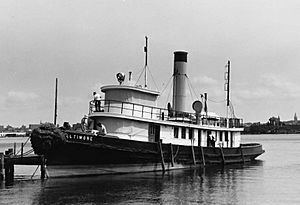Baltimore (tug) facts for kids

Baltimore in 1989
|
|
| History | |
|---|---|
| Name | Baltimore |
| Namesake | Baltimore, MD |
| Builder | Skinner Shipbuilding Company |
| Launched | 1906 |
| Status | Museum ship |
| General characteristics | |
| Displacement | 81 tons (gross), 55 tons (net) |
| Length | 84.5 ft (25.8 m) |
| Installed power | Compound reciprocating steam engine |
|
Baltimore (tug)
|
|
| Location | Baltimore Museum of Industry, Baltimore, Maryland |
| Built | 1906 |
| Architect | Skinner Shipbuilding |
| NRHP reference No. | 93001613 |
| Significant dates | |
| Added to NRHP | 4 November 1993 |
| Designated NHL | 4 November 1993 |
The Baltimore is a special steam-powered tugboat built in 1906. It was made by the Skinner Shipbuilding Company in Baltimore, Maryland. This tugboat used to be the oldest working steam tug in the United States.
Today, the Baltimore is a Museum ship. It is docked at the Baltimore Museum of Industry. It cannot leave its dock because it no longer has a special license. Its hull is also not strong enough for open water. The Baltimore was built to be a city tugboat. It could help city barges and welcome important visitors. It also worked as a small fireboat and could break light ice. In 1993, the Baltimore was named a National Historic Landmark. A group called the Baltimore and Chesapeake Steamboat Co. helps take care of it.
Contents
What is the Baltimore Tugboat Like?
The Baltimore tugboat has a special steam engine. This engine gets its power from a Scotch marine boiler. The boat's body, called the hull, is made of strong rivetted iron. This iron hull has lasted longer than hulls made of steel or wood. The boat is about 84.5 feet (25.8 m) long. It weighs about 81 tons. The deckhouse, which is the main cabin area, is made of wood.
How Does the Boiler Work?
The boiler on the Baltimore was replaced in 1922. It is a large, round tank that creates steam. This steam powers the engine. Inside the boiler, there are two furnaces that used to burn coal. In 1957, the boiler was changed to burn oil. But now, it has been changed back to burn coal again. This was part of the restoration work done by the Baltimore Museum of Industry. The boiler creates steam at a pressure of about 115 psi (790 kPa).
What Kind of Engine Does It Have?
The Baltimore is powered by a steam engine. This type of engine was common for tugboats back then. It has two main parts, called cylinders, that work together. Steam from the boiler pushes these cylinders. This movement turns a large propeller at the back of the boat. The propeller is about 6.75 feet (2.06 m) wide. This is how the tugboat moves through the water.
Other Important Parts of the Tugboat
The Baltimore has several pumps. These pumps can help fight fires with water hoses. They can also pump water out of the boat if it starts to flood. The tugboat also has a special machine called a dynamo. This dynamo creates electricity for the boat. It was quite unusual for a boat in 1906 to have an electrical system.
What is the Deckhouse and Pilothouse Like?
The main cabin area, called the deckhouse, runs almost the whole length of the boat. It is made of wood. On top of the deckhouse is the pilothouse. This is where the captain steers the boat. The pilothouse has a large steering wheel. It also has voice pipes and bells to talk to the engine room. There are whistles to signal other ships.
The deckhouse has a front room called a saloon. It also has the boiler and engine room in the middle. At the back, there is a kitchen, called a galley. It used to have a coal-burning stove. There are also restrooms for officers and crew. On the deckhouse roof, there is a small metal lifeboat. It can hold eleven people.
The Baltimore's Interesting History
The Baltimore tugboat had many jobs for the city of Baltimore. It gave tours to school groups and carried important people. It also took part in many ceremonies. In 1922, another ship accidentally fell onto the Baltimore. This damaged its pilothouse. While it was being repaired, the city replaced its boiler.
A famous event happened in 1916. The Baltimore met a German merchant submarine called the Deutschland. This submarine was visiting America before the United States joined World War I. The Baltimore helped patrol the area to make sure everyone followed the rules of neutrality.
In 1956, the Baltimore was given to the Maryland Port Authority. Later, in 1963, it was sold to a man named Alexander Luckton, Jr. He wanted to use it to tow a barge full of books to Puerto Rico. But his health failed, and the plan was canceled. The tugboat was sold again.
In 1979, the Baltimore sank at its dock in the Sassafras River. It was in about fifteen feet of water. In 1981, the tugboat was given to the Baltimore Museum of Industry. After several tries, the boat was raised. Since then, it has been carefully repaired and preserved. In recent years, it has received money to help with its restoration work.
 | May Edward Chinn |
 | Rebecca Cole |
 | Alexa Canady |
 | Dorothy Lavinia Brown |


